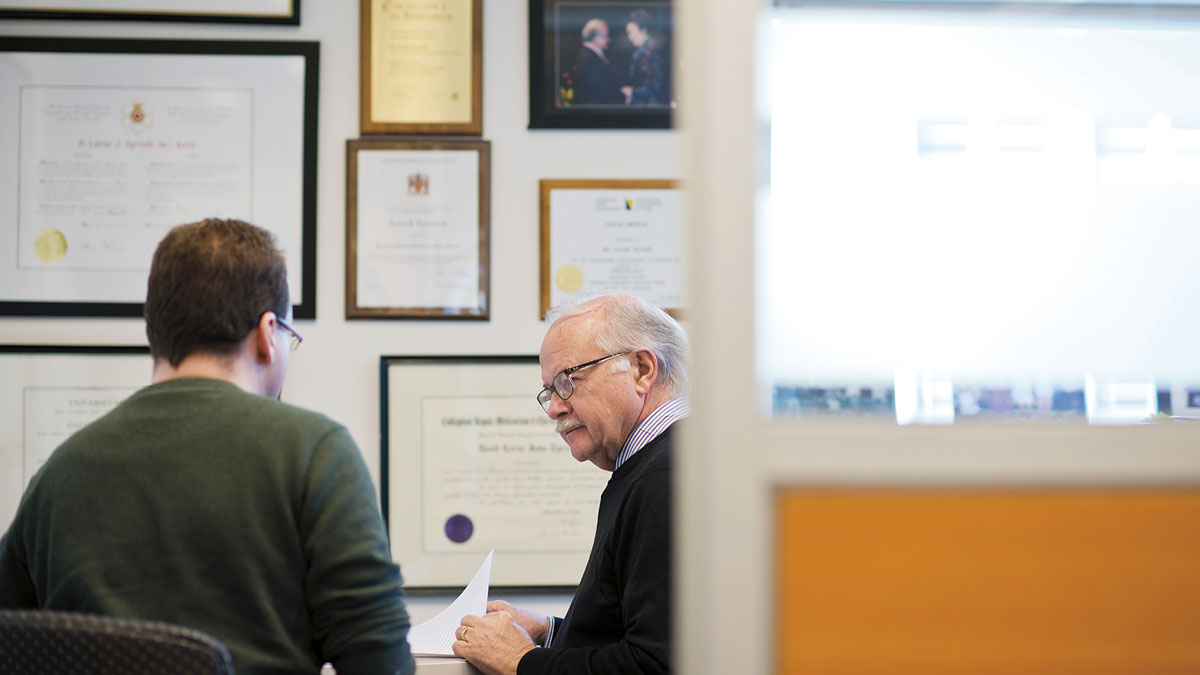
[Photo Credit: John Ulan]
The Li Ka Shing Institute of Virology brings together top researchers and students from around the globe. What's now possible in the field of virology because of the Li Ka Shing Institute that wouldn't be possible without it?
We designed and built the labs to be open, and informal discussions frequently lead to formal collaborations. In fact, we have people from numerous countries, including some that don't get along politically - Iran, Iraq, Israel, Egypt, China - but here the researchers have a very strong social system and they really help each other. Truly, a sociologist could study us.
Mr. Li wanted an emphasis on translating our discoveries to benefit patients, and in this research environment, we are emphasizing the translation of discoveries to products that will ultimately benefit patients.
How will people benefit from the work being done at the Li Ka Shing Institute?
Michael Houghton [Canada Excellence Research Chair in Virology] and I have a new grant and are working hard to develop a vaccine for hepatitis C. This would be a tremendous breakthrough. With the recent advances in treatment and a vaccine, a country could say, "We have the means to eliminate this disease." And the power of philanthropy again helps us to achieve this goal. (The donation and the creation of the Li Ka Shing Institute attracted Michael to the University of Alberta in the first place.)
In terms of the broader community, we need a stronger biotech industry in the province of Alberta and we hope to spin off some successful biotech companies. Right now, a lot of scientists who want to go into industry end up leaving the province or the country. Successful spinoff companies create jobs in our city and in a province that needs to diversify and retain highly qualified people. The Li Ka Shing donation has transformed virology at the university, and more and more we're recognized as one of the top viral research institutes on the international stage.
The power of philanthropy has been a golden thread through your career. What is the significance of philanthropy to donors and researchers?
The tremendous power of philanthropy is that the money you get is sometimes unrestricted, which can be extremely useful in addressing the university's most pressing needs. When I was dean of the Faculty of Medicine, we had a team working on islet cell transplants. In about 1999, the team lost its grants and I was able to use some funds from unrestricted donations to keep the team together. Six months later they made a wonderful discovery: the Edmonton Protocol and the islet cell transplants, a huge step forward in treating Type 1 diabetes. At the time of the discovery, nearly 250 different media outlets called the faculty to learn more. And when success comes, each donor feels part of the achievement.
You are also a donor to the University of Alberta. Was that the experience that inspired you to give?
I think there are two reasons that I give. First, there are some causes that are required to broadly help people in need - Edmonton Food Bank or the United Way - and it feels good to help. On the other hand, I love to give to causes that help transform something that is good into something that is excellent. We have a very good university, but transformative philanthropy is critical to being truly outstanding. Look at how Canada's Winter Olympic team has been transformed by donations to support the Own the Podium initiative. Results like this make you feel good about donating.
How about outside the university? What occupies your personal time?
I've been an Edmonton Oilers fan since the beginning - I have a lot of the old films and I occasionally go back and look at them and it's still so beautiful. I also farm. So as a farmer and as an Oilers fan, you could say I'm the kind of person who always looks forward to next year.